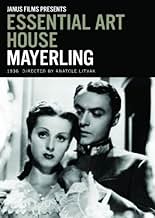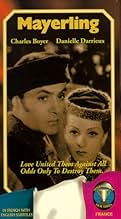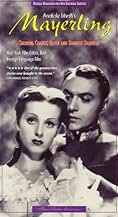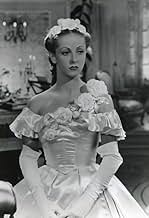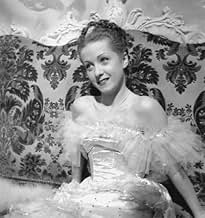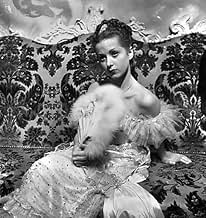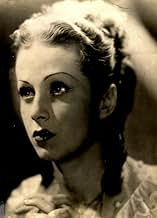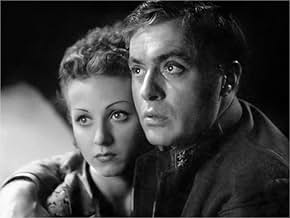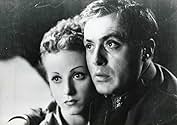Füge eine Handlung in deiner Sprache hinzuRodolfe, Crown Prince of Austria, is fettered on all sides. He's bored; his father, the emperor, is domineering; his politics are more liberal than his father's, but he knows his views carry... Alles lesenRodolfe, Crown Prince of Austria, is fettered on all sides. He's bored; his father, the emperor, is domineering; his politics are more liberal than his father's, but he knows his views carry no weight. He agrees to marry a princess to sire an heir, then spends his nights as a pla... Alles lesenRodolfe, Crown Prince of Austria, is fettered on all sides. He's bored; his father, the emperor, is domineering; his politics are more liberal than his father's, but he knows his views carry no weight. He agrees to marry a princess to sire an heir, then spends his nights as a playboy. In 1888, he meets Marie Vetsera, 17, a baroness' daughter. She is resolute, smitten,... Alles lesen
- Auszeichnungen
- 3 Gewinne & 1 Nominierung insgesamt
- La baronne Vetsera
- (as Marthe Regnier)
- La cousine de Marie
- (as Assia)
- Une fille
- (as Ribès)
- Szeps
- (as Bergeron)
- Le chef de la police
- (as Sokoloff)
- Le premier policier
- (as Aimos)
- Le second policier
- (as Siméon)
Empfohlene Bewertungen
Opening thoughts: There were plenty of reasons for seeing 'Mayerling'. Have always loved period dramas, and especially when it is a period of history that really piques a lot of interest. Having gained a major interest in Austrian royalty since my holiday to Vienna last year (especially Empress Elisabeth, aka Sissi), this was one such period. It also intrigued seeing Charles Boyer in an early role and the kind that he became well known for and for seeing one of Anatole Litvak's early films.
'Mayerling' is a very, very good film indeed. Not perfection, but there are numerous good things and most of those good things are actually exceptional. Of the two 'Mayerling' films seen, the other being the one from the 50s, this is infinitely better with it actually being good (was underwhelmed by the other). It is very easy to see why Boyer became a major international star after this and the film is one of Litvak's best and most interesting early films (the film that also helped make his career bigger), as far as his films in general go it's not quite 'All This and Heaven Too' and especially 'The Snake Pit' but it is in the better end.
Bad things: It isn't perfect. Will agree that Gabrielle Dorziat wasn't right for Elisabeth, she came over as too old and didn't get enough of the ahead of the time astonishing beauty that Elisabeth was famous for the struggles she faced in her life.
Also thought that the lead up to the tragic conclusion was too overlong and dragged out.
Good things: However, 'Mayerling' looks absolutely ravishing, with sumptuous costume designs and art direction and the photography is some of the most beautiful of any film from the late 30s. Was not sure as to whether Arthur Honegger's music would gel stylistically and in mood, but it is suitably dramatic without being bombastic or too melodramatic and is quite lush. Litvak's direction is some of his most stylish and sensitive.
Furthermore, the script is thought provoking and doesn't go into soap opera territory too much. There may be cliches here but they are not done in too cliched a manner. The story always intrigues, even in the slower patches, and has emotional impact and very passionate romance. The conclusion itself is very moving and the love is very deeply felt.
Boyer and Danielle Darrieux are both perfectly cast, giving performances of great dignity and passion. Their chemistry smolders. The supporting cast are excellent too, with reservations had for only Dorziat.
Concluding thoughts: Overall, very, very good.
8/10.
In this French-language version by Ukranian director Anatole Litvak, we get a highly-romanticised version of the story with Charles Boyer and Danielle Darrieux as the star-crossed but ill-fated lovers.
The direction throughout is stylish and tasteful, Litvak impressing in his recreation of the Viennese Court with its surface splendour barely concealing the jostling for position and rumour-mongering beneath the facade. Boyer and Darrieux are excellent in their lead roles, his character the reforming, rebellious heir to the throne, unhappy in his arranged marriage and she the youthful, highly-impressionable innocent caught up in the first great passion of her life.
The concluding climax is sensitively and humanely depicted too with my only major criticisms of the film being an over-reliance on the use of the no-doubt in-vogue montage sequences and a tendency to slightly overstay the camera's welcome in certain scenes.
Nevertheless, this was a fine retelling of the notorious scandal and it's no surprise that its artistic and commercial success lured director Litvak to Hollywood where he enjoyed a distinguished career for many years.
The story unfolds to the inevitable conclusion of murder/suicide which threw the Empire into turmoil. History may record the events of what happened at Mayerling a little differently but it surely makes a good story of thwarted love and royal politics. The 1968 remake with Omar Shariff and Catherine Deneuve is not bad either. This legendary romance has fascinated people since the turn of the century. So have the Kleenex handy and enjoy!!
Indeed Emperor Franz Joseph lived on and on and on. He did not die until 1916 and the Empire would die with the end of World War I when so many new states were created in Europe. But when people do start getting old the succession in the dynasty becomes important.
Charles Boyer plays the dissolute and dissipated Crown Prince Rudolf who always gets a following whether he wants it or not in any monarchy. He's got more liberal views than his father played here by Jean Dax. What's not covered here is that Franz Joseph when he assumed the throne in 1848 was a rather serious minded youth of the age of 17, a total contrast to his kid. It made for continual conflict exacerbated by court politics.
The Crown Prince was more interested in letting the good times roll like there was no tomorrow. The Emperor has already arranged a match which the Prince has reluctantly agreed to as per his duty to the state. But then he meets Danielle Darrieux who plays Marie Vetsera who is of minor nobility not quite up to Hapsburg standards. After that he wants only to be with her. And she wants only him, not even the crown if he has to give it up.
Rudolf was a momma's boy in every sense of the word. The Empress Elizabeth married Franz Joseph and she was a wild child herself. Her story is covered in the Grace Moore/Franchot Tone movie The King Steps Out. Although she's at court here in this film, most of the years of her reign she lived apart from the Emperor partaking of the various resorts at places like Baden-Baden and Biarritz. Actress Gabrielle Dorziat plays Sissi and she sympathizes with her son, but not much she can do. Boyer and Dorziat have a very emotional scene covering that.
Darrieux all wide eyed and innocent does a wonderful job as the luckless Marie Vetsara. Boyer scores well as the tragic Rudolf who would just not settle down to his responsibilities.
With the British monarchy crisis in the news in America and everywhere else but the British Empire, Mayerling found an interested audience in 1936. Anatole Litvak directed it and he, Boyer, and Darrieux would be in America soon enough. Boyer was already here, but returned to France for this film. No doubt he was cast for box office reasons in the foreign markets, most especially the American one.
All of them delivered a fine film.
Wusstest du schon
- WissenswertesOne of the first foreign films with sound to become a hit in the United States. It made an international star out of Charles Boyer.
- VerbindungenFeatured in Final Instinct (1991)
Top-Auswahl
Details
Box Office
- Bruttoertrag in den USA und Kanada
- 240.000 $
- Laufzeit
- 1 Std. 36 Min.(96 min)
- Farbe
- Seitenverhältnis
- 1.33 : 1

